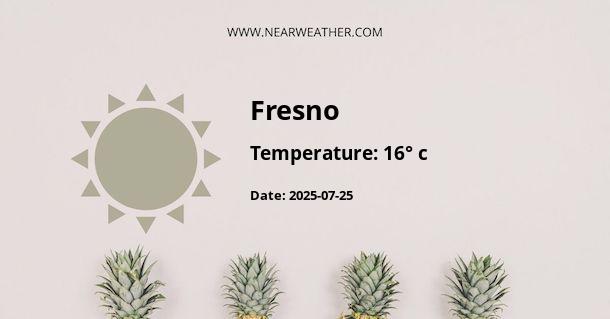Climate and Weather in Fresno, CO
Fresno, CO experiences a semi-arid climate characterized by hot, dry summers and cold, wet winters. The climate is influenced by its location in the southeastern part of the state and its proximity to the Rocky Mountains. Understanding the year-round weather patterns in Fresno is essential for residents, tourists, and businesses operating in the area.
Seasonal Weather Patterns
Let's delve into the seasonal weather patterns in Fresno to understand the climatic conditions throughout the year.
Spring (March - May)
Spring in Fresno brings mild temperatures and occasional rainfall. Daytime temperatures range from 60°F to 80°F, making it a pleasant time to explore the outdoors. However, evenings can still be cool, with temperatures dropping to around 40°F. It's important to be prepared for fluctuations in temperature during this season.
Summer (June - August)
Summer is characterized by hot and dry weather in Fresno. Daytime temperatures often surpass 90°F, and occasionally surpass 100°F. It's essential to stay hydrated and seek shade during the peak of summer. Nighttime temperatures may drop to the mid-60s°F, providing some relief from the daytime heat.
Fall (September - November)
During fall, temperatures begin to cool down gradually. Daytime temperatures range from 70°F to 85°F in September, but they drop to 50°F to 65°F by November. Fall is generally dry, with occasional windy days. It's a great time to witness the changing colors of the surrounding landscape as the trees prepare for winter.
Winter (December - February)
Winter in Fresno is cold and can bring significant snowfall. Daytime temperatures range from 35°F to 50°F, while nighttime temperatures can drop below freezing. It's important to be prepared for winter driving conditions and to dress warmly when venturing outdoors.
Precipitation
Fresno receives an average of 12 inches of precipitation per year. The majority of this precipitation falls during the winter and early spring months. The summer and fall months are relatively dry, with minimal rainfall. Snowfall is common in the winter months, contributing to the overall precipitation levels.
Extreme Weather Events
While Fresno generally experiences mild weather throughout the year, it is important to be prepared for potential extreme weather events. These can include severe thunderstorms in the summer, which may bring strong winds and hail, as well as winter storms that can result in heavy snowfall and icy conditions.
Climate Data for Fresno, CO
Here is a summary of the average climate data for Fresno, CO:
| Month | High Temperature (°F) | Low Temperature (°F) | Precipitation (inches) |
|---|---|---|---|
| January | 42 | 15 | 0.9 |
| February | 45 | 17 | 0.8 |
| March | 54 | 23 | 1.5 |
| April | 64 | 31 | 1.4 |
| May | 73 | 38 | 1.2 |
| June | 83 | 46 | 0.6 |
| July | 89 | 53 | 1.4 |
| August | 86 | 52 | 1.3 |
| September | 78 | 43 | 1.0 |
| October | 66 | 33 | 1.1 |
| November | 52 | 23 | 0.9 |
| December | 43 | 16 | 0.9 |
The climate data shows the average high and low temperatures, as well as the monthly precipitation levels in Fresno throughout the year.
Conclusion
Understanding the climate and weather patterns in Fresno, CO is crucial for making informed decisions about activities, travel, and everyday plans. Whether enjoying the warm summer days or braving the winter snow, being prepared for the seasonal variations ensures a safe and enjoyable experience in this semi-arid climate.
A - Fresno's Latitude is 5.152640 & Longitude is -75.036240.
A - Weather in Fresno is 14° today.
A - Climate Conditions in Fresno shows overcast clouds today.
A - Humidity in Fresno is 93% today.
A - Wind speed in Fresno is 7.16 km/h, flowing at 269° wind direction. today.
